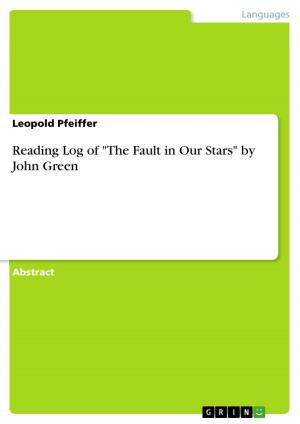'A Midsummer Night's Dream' and 'The Tempest' in the mirror of changing critical approaches
Nonfiction, Entertainment, Drama, Anthologies| Author: | Cornelia Kaltenbacher | ISBN: | 9783638049870 |
| Publisher: | GRIN Publishing | Publication: | May 19, 2008 |
| Imprint: | GRIN Publishing | Language: | English |
| Author: | Cornelia Kaltenbacher |
| ISBN: | 9783638049870 |
| Publisher: | GRIN Publishing |
| Publication: | May 19, 2008 |
| Imprint: | GRIN Publishing |
| Language: | English |
Thesis (M.A.) from the year 2007 in the subject American Studies - Comparative Literature, grade: gut, University of Dusseldorf 'Heinrich Heine', 48 entries in the bibliography, language: English, abstract: Shakespeare is one of the most analysed and 'criticised' poet in the history of literature. Why Shakespeare? The answer is easy. He is not only most analysed but also the most popular dramatist that has ever existed. Shakespeare's drama has been fascinating his audience and readers through the centuries. The plots of Shakespeare's drama seem to be simple, dealing with human and social themes like love, marriage, murder, intrigue, complot and revenge. On a first sight, they remember us of a good and entertaining Hollywood Film. But is this all what Shakespeare has to say through his drama? Did he really intend to write commercial plays, without giving a deeper sense to his literary work? I don't think so. I think Shakespeare achieved through his 'simple' plots to get deeply into the minds and souls of his audience, in order to make them conceive the complexity of their own lives and feelings. I do not intend to find out his personal message in the drama or to interpret his intentions. I will rather concentrate on his work and try to find out, what kind of message Shakespeare's comedy transmitted to his audience and above all to his experienced readers, better said, to his literary critics. My paper shall reveal the complexity and the deep psychological meaning of Shakespeare's comedy. Returning to my first question why Shakespeare? I would like to answer it, by quoting one of my favourite critics, Northrop Frye: 'For all that has been written about it, Shakespearean comedy still seams to me widely misunderstood and underestimated, and my main thesis, that the four romances are the inevitable and genuine culmination of the poet's achievement, is clearly less obvious to many than it is to me.' 1 I consider Frye's assumption on Shakespearean comedy the adequate answer to my question. In this paper I intend to seek the deep sense of A Midsummer Night's Dream and The Tempest, by posting them in a mirror of changing critical approaches, beginning with the mythological view, continuing with the political and new critical perspective and ending with my personal notes. My main purpose in this paper is to demonstrate that Shakespeare's comedy does not only have a delighting function but also exercises a deep psychological impact on the old and new generations. In my opinion he was not only a genius of the drama, but also an initiator of the renaissance of mythical and archaic values in the modern world.
Thesis (M.A.) from the year 2007 in the subject American Studies - Comparative Literature, grade: gut, University of Dusseldorf 'Heinrich Heine', 48 entries in the bibliography, language: English, abstract: Shakespeare is one of the most analysed and 'criticised' poet in the history of literature. Why Shakespeare? The answer is easy. He is not only most analysed but also the most popular dramatist that has ever existed. Shakespeare's drama has been fascinating his audience and readers through the centuries. The plots of Shakespeare's drama seem to be simple, dealing with human and social themes like love, marriage, murder, intrigue, complot and revenge. On a first sight, they remember us of a good and entertaining Hollywood Film. But is this all what Shakespeare has to say through his drama? Did he really intend to write commercial plays, without giving a deeper sense to his literary work? I don't think so. I think Shakespeare achieved through his 'simple' plots to get deeply into the minds and souls of his audience, in order to make them conceive the complexity of their own lives and feelings. I do not intend to find out his personal message in the drama or to interpret his intentions. I will rather concentrate on his work and try to find out, what kind of message Shakespeare's comedy transmitted to his audience and above all to his experienced readers, better said, to his literary critics. My paper shall reveal the complexity and the deep psychological meaning of Shakespeare's comedy. Returning to my first question why Shakespeare? I would like to answer it, by quoting one of my favourite critics, Northrop Frye: 'For all that has been written about it, Shakespearean comedy still seams to me widely misunderstood and underestimated, and my main thesis, that the four romances are the inevitable and genuine culmination of the poet's achievement, is clearly less obvious to many than it is to me.' 1 I consider Frye's assumption on Shakespearean comedy the adequate answer to my question. In this paper I intend to seek the deep sense of A Midsummer Night's Dream and The Tempest, by posting them in a mirror of changing critical approaches, beginning with the mythological view, continuing with the political and new critical perspective and ending with my personal notes. My main purpose in this paper is to demonstrate that Shakespeare's comedy does not only have a delighting function but also exercises a deep psychological impact on the old and new generations. In my opinion he was not only a genius of the drama, but also an initiator of the renaissance of mythical and archaic values in the modern world.















